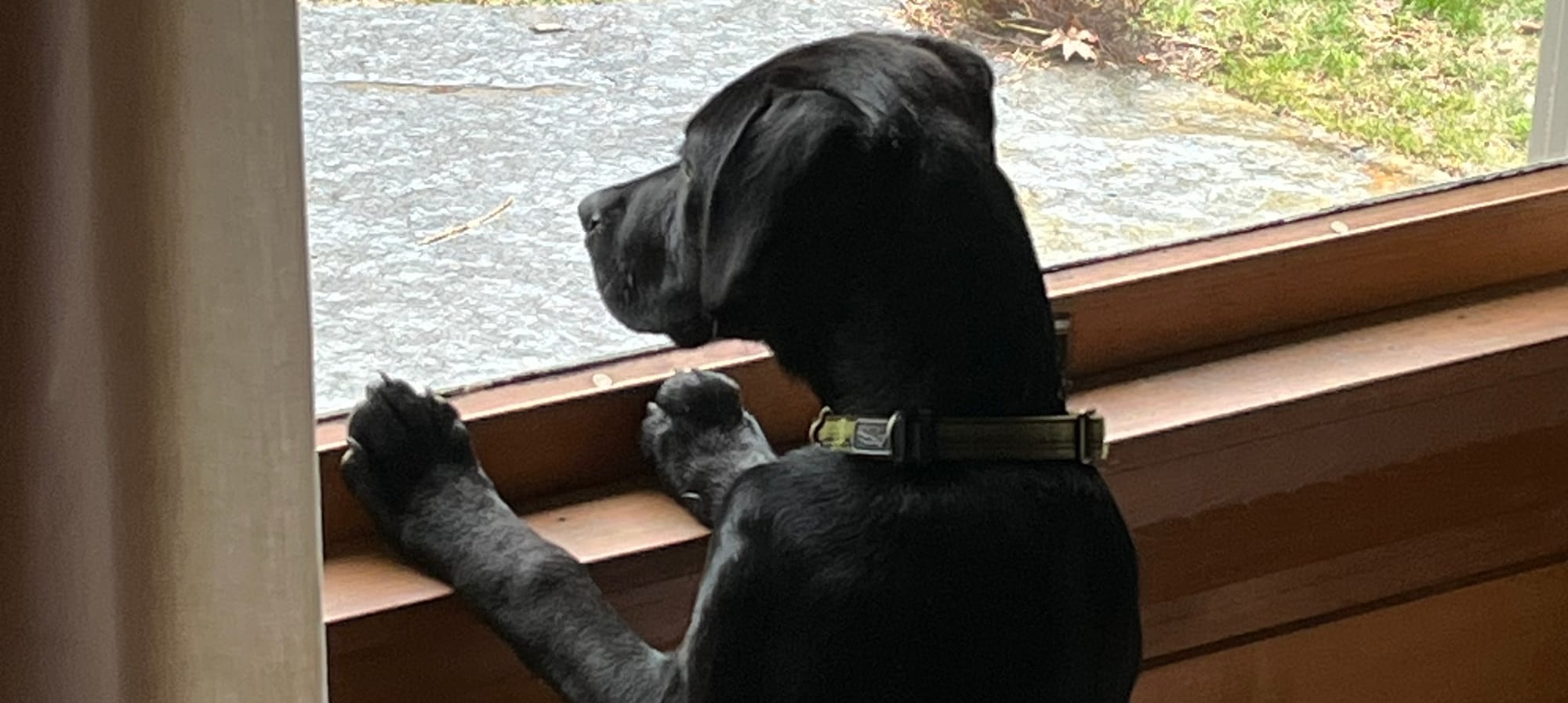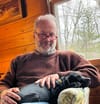Saving Huckleberry
Life without a dog for nine months had advantages, mobility among them. Go anywhere, anytime, without having to provision for the animal.

We have a new puppy, a black lab mix rescued by an organization called For the Love of Labs that we collected from a foster home in nearby Richmond, New Hampshire. He is now twelve weeks old with a shiny coat, long legs, webbed feet, a shortish lab nose, sharp little teeth that desire to sink into everything and an acute fear of missing out (FOMO, for the social media hipsters): he follows us room-to-room to guard against the chance of any new adventure breaking out in his absence. His name is Huckleberry.
Huck fills the space left behind by our golden retriever of many years, Potter, who died in his sleep last summer at the age of thirteen after a full life living at the Hancock Inn. For Potter, the inn came with many daily admirers and complimentary breakfast each morning. Huck may not grow up with as much attention around him, but his new life does include breakfast (currently, also lunch and dinner), and there is a pond for swimming, a field for running, plus other creatures great and small, many of which he will have to learn to stay away from.
Life without a dog for nine months had advantages, mobility among them. Go anywhere, anytime, without having to provision for the animal. We spent a lot of time thinking about that particular luxury. Now we do not so much as travel from one room to another in the house without Huckle-Buckle scampering behind. And the doors to unoccupied rooms are closed, and the way to the basement is barricaded to limit his ability to make his own adventures. We are experiencing the cloistered life again.
Also, the dogs sleep on our beds. Sorry, it has always been that way. As a boy, I had a dachshund named Suzanne, named for my grandmother (who seemed honored by the attribution). Every night, Sue Sue burrowed under the sheets to sleep between my feet. I remember the waking-up moment in the morning when she would wriggle up from the darkness, poke her head out to look at me, take her first breath of fresh air, and sneeze. Potter was eighty-five pounds. He did not burrow to the end of the bed; he camped on top. The extra legroom had been nice since his departure. Huck will likely grow that large, but he curls into a ball between our heads for the moment. Occasionally, he stretches out his neck and lays it across mine, as new puppies do lying beside their mother, twined together into a ball of fur.
Then there are the plaintive puppy eyes that catch you at different times during the day with their entreaty, are you done yet? Those eyes never grow old; they grow more penetrating and plaintive, especially when they can barely see before them. Huck’s sharp eyes have drilled me twice while writing today. He has padded over to sit at my feet, head turned up, eyes looking into mine.
Are you done yet?
Not quite. There is the matter of PetFinder.com, which we used for the first time to find Huckleberry. We have had dogs for the last twenty years, our first in 2000, in the nascent days of internet search engines. We rescued from a local no-kill shelter and acquired Potter from a nearby breeder. We returned to that shelter for this next puppy chapter in life, but they no longer permit out-of-state adoptions. We surfed Monadnock shelters and humane societies but needed a wider net. This pushed us to PetFinder, a pet search engine. We plugged in our parameters (puppy, New England, whatever else) and—shazam!
We thought it might be hard to find a puppy. It is not. It is worse than that. If you released into the open all of the dogs up for adoption on PetFinder.com, you might be able to witness the result from space, like the stampede of wildebeests on the African plains, except that they would be dogs without the skills to survive in the wild.
Where do they all come from? Sadly, it appears the answer is not simply boy and girl dogs. They come from puppy factories and neglect.
The math is straightforward: one male and female dog yields four to six new dogs, which can produce another twelve to eighteen new dogs, in turn yielding a potential thirty to forty more dogs, growing to an animal crisis in just a few short generations because who is going to care for those puppies? Our house is already cordoned off, we are not traveling, we take turns going here and there, we are squeezing back into bed, and I need to wrap up this column shortly because I owe Huckle-Buckle a little playtime. There is not enough human patience in the world, including here, to save all the dogs.
But if you have the tiniest room in your heart or home to take one, it has its rewards. No one else in life will follow you wherever you go without question.
And please, let us know. Huck needs playdates.
Published in the Monadnock Ledger-Transcript, April 25, 2023

